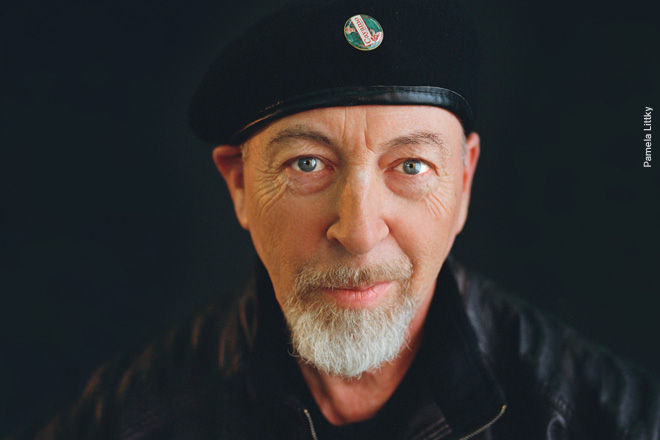 RICHARD THOMPSON
RICHARD THOMPSON
The British folk-rock hero makes an Americana connection on his latest
Richard Thompson is not content to stay in one musical place. Since the 1960s, when his ace guitar skills led Fairport Convention into the rarified league of groundbreaking musicians who invented British folk rock, he’s been something of a human prism, shifting and turning his talents to spotlight musical beauty—sometimes in the unlikeliest of places, as when he chose to cover Britney Spears’ “Oops!…I Did It Again,” for a live album in 2003. Tapping Nashville veteran Buddy Miller to helm his new album, Electric, Thompson unabashedly amps up Americana and injects it with a healthy dose of Celtic sound.
How did you approach the songwriting?
In this case, I was interested to write for a trio. We had been doing some shows as a trio and I thought, “This is an interesting format.” It’s quite inspiring to plan things this way because with a trio you have to think differently, and different things occur to you.
Do you write without an instrument?
That’s true—sometimes I do write without an instrument, but I refer to an instrument from time to time. Sometimes when it’s just in your head it’s a bit freer. It’s not so tied down to patterns that your fingers fall into. So you can imagine slightly beyond what you normally do, and at a later stage you can refer to an instrument and bring it down to earth more. It’s like you’re walking down the street, and there’s a rhythm to walking, and you might get an idea that fits that rhythm. It’s nice to keep it all floating in your own head for a while.
Do you write one project at a time?
More and more I write with specific projects in mind, but I have a few projects on the go all the time. I’ll think, “This is a good song for that acoustic project,” or “That’s a good one for the theater thing I was thinking of.” So there are always a few choices where a song can be placed. But I do find that I am project-driven.
Why choose Buddy Miller?
I don’t always hire producers. But I thought it would be interesting to look outside for this one and figured Buddy would be the most interesting person to work with. Of course, it meant taking the band and shipping all the gear to Nashville. But I believed it would be the right environment—I’d heard the albums Buddy recorded at his house, and there was a certain sensibility and atmosphere to them. It turned out to be a fantastic choice.
What made it so desirable?
Because it’s a house, it’s a relaxed atmosphere. He records on the ground floor and lives upstairs. So the drums were in one corner, and the tape machine was in another corner, and I’m in the kitchen alcove with the coffee machine. It’s all very cozy and low-key, more than what you can achieve in the studio. There is no red light, so you can drift into recording, and suddenly you’ve done it.
Was recording a long process?
We recorded most of the songs in four days—and then messed around for another week, doing a few things, trying to justify our existence.
Do you enjoy playing older songs?
There are some I can’t relate to, songs I wrote when I was 18. I wasn’t sure what I was doing when I wrote some of them in the first place. Still, it is nice to revisit some old songs.
–Nancy Dunham



comment closed